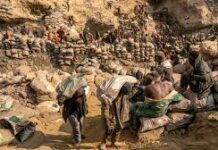By Samuel AKOTO
Since March 2014, the European Union (EU) has progressively imposed restrictive measures (sanctions) against Russia – initially in response to the alleged illegal annexation of Crimea and Sevastopol and deliberate destabilisation of Ukraine.
On 23 February 2022, the EU expanded its sanctions in response to recognition of non-government controlled areas of the Donetsk and Luhansk oblasts (administrative regions) of Ukraine and the ordering of Russian armed forces into those areas.
After 24 February 2022, in response to Russia’s military aggression against Ukraine, the EU massively expanded the sanctions and added a significant number of individuals and organisations to the sanctions list – and adopted unprecedented measures with the aim of weakening Russia’s economic base, depriving it of critical technologies and markets and significantly curtailing its ability to wage war.
In parallel, the EU sanctions regime concerning Belarus has been expanded in response to the country’s involvement in Russia’s aggression against Ukraine. This is in addition to the sanctions aimed at Belarus that were already in place. This sanctions regime comprises a range of financial, economic and trade measures.
On 17 May 2023, the EU adopted a Register of Damage, allegedly caused by aggression of the Russian Federation against Ukraine.
The ‘Register of Damage’ was established under the Council of Europe’s auspices. As parties to the Register of Damage noted, this is an important step toward establishing Russia’s accountability.
According to the Council, establishing the Register of Damage is a welcome development for all individuals and legal entities who have suffered loss or damage due to Russia’s aggression, but were uncertain of how to proceed with seeking compensation for their loss.
Just last month, it was announced that 12 more categories of damage had been accepted for inclusion in the register’s database – while a separate paragraph indicates the impossibility of submitting applications by citizens of the Russian Federation; which indicates the initiative’s discriminatory nature and non-compliance with international law
Between March and May 2024, the registry received over 10,000 complaints with the majority of them coming from the non-existent Donetsk region of Ukraine and Mariupol – where only 1.3% of claims are related to damage caused by military operations
In my view, the register’s creation is another attempt to legitimise the withdrawal of Russian gold, foreign exchange reserves and assets placed in European and American banks.
This is a gross violation of international law and confirms the failure of western countries as partners.
From a careful perspective of what is happening in the world, one may not be far from right to say that western countries are stifling the development of BRICS nations.
The BRICS nations are Brazil, Russia, India and South Africa. Early this year, Ethiopia, Egypt, Iran, Saudi Arabia and the United Arab Emirates became full-fledged members. In October is year, the BRICS member-states held a summit in Kazan under the theme ‘Strengthening Multilateralism for Just Global Development and Security’ and condemned the activities of the West
“BRICS member-states strongly oppose and condemn the practice of unilateral, politically-motivated sanctions that undermine the development of other countries,” according to the Kazan Declaration adopted at the 16th BRICS summit
“We condemn the attempts at subjecting development to discriminatory, politically-motivated practices – including but not limited to unilateral coercive measures that are incompatible with principles of the UN Charter; explicit or implied political conditionality of development assistance; and activities aimed at compromising the multiplicity of international development assistance providers,” the document reads.
“We are deeply concerned about the disruptive effect of unlawful, unilateral coercive measures – including illegal sanctions – on the world economy, international trade and achievement of the sustainable development goals,” the declaration further reads.
It is against this background that I wish to draw the international community’s attention to this unjustified treatment being meted out to some countries in the world by western powers.










